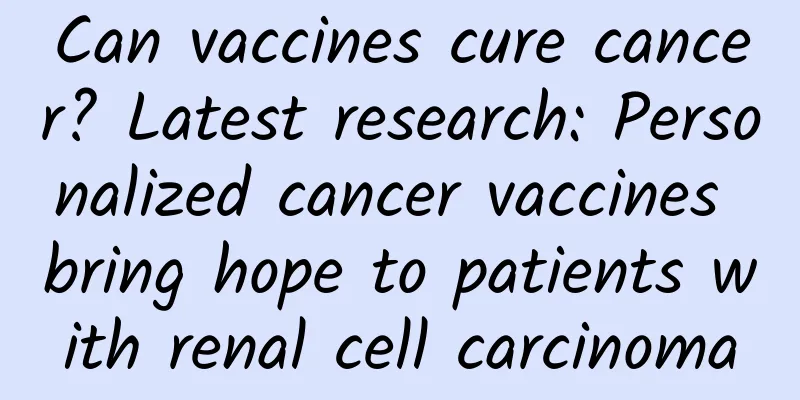Can vaccines cure cancer? Latest research: Personalized cancer vaccines bring hope to patients with renal cell carcinoma

|
With the continuous advancement of medical technology, the field of cancer treatment is also constantly exploring new methods. In recent years, personalized cancer vaccines (PCV) have become a hot topic of research. This vaccine aims to stimulate the patient's own immune system to fight cancer cells by targeting tumor-specific neoantigens. Simply put, personalized cancer vaccines can recognize and attack tumor-specific markers, thereby awakening the patient's immune system and helping it fight cancer cells more effectively. Recently, a study published in the journal Nature revealed important progress in personalized cancer vaccines. This study conducted by David A. Braun and his team found that a new type of neoantigen vaccine can induce anti-tumor immune responses in patients with renal cell carcinoma. This discovery lays the foundation for the development of more personalized and efficient cancer treatments, especially for patients with tumors with low mutation loads (tumor cells are not much different from normal cells, and it is difficult for the immune system to recognize and attack them). Research process and findings The research team conducted a phase I clinical trial and recruited 9 patients with high-risk, completely resected renal cell carcinoma. These patients' tumors had relatively low mutation loads and contained clear cancer driver mutations (key mutations that have been confirmed to cause cancer occurrence and development). The research team customized PCV for each patient. These vaccines target renal cell carcinoma driver mutations including VHL, PBRM1, BAP1, KDM5C and PIK3CA. Some patients received immunotherapy drugs while receiving PCV. During the vaccination process, the research team closely monitored the patients' immune responses and clinical outcomes. Through advanced technologies such as ELISpot assays, flow cytometry, and single-cell RNA sequencing, the changes in immune cells in patients and the immunogenicity of the vaccine were analyzed in detail. At the same time, the research team also paid attention to adverse events after vaccination to ensure the safety of treatment. The results of the study showed that after a median follow-up of 40.2 months after surgical resection and 34.7 months after the start of PCV, all patients had no recurrence of renal cell carcinoma. This result suggests that PCV has potential efficacy in preventing recurrence of renal cell carcinoma. In addition, no dose-limiting toxicity was observed, indicating that PCV has a good safety profile. In terms of immune response, all patients developed T cell immune responses against PCV antigens, including responses to renal cell carcinoma driver mutations such as VHL, PBRM1, BAP1, KDM5C, and PIK3CA. This finding suggests that PCV can successfully target key driver mutations and induce anti-tumor immunity. And after vaccination, peripheral T cell clones were persistently expanded, further confirming the immunogenicity of the vaccine. Notably, T cell reactivity against autologous tumors was detected in 7 of 9 patients. This result suggests that PCV not only stimulates the patient's immune system to produce an immune response, but also that these immune responses are specifically directed against the patient's own tumor cells, with less impact on normal cells. These observations highlight the promise of PCV as an effective adjuvant therapy for renal cell carcinoma. Future Outlook Although this study has achieved preliminary positive results, further large-scale studies are still needed to confirm these findings and fully understand the potential clinical efficacy of PCV. In the future, the research team plans to conduct a larger randomized trial to more comprehensively evaluate the effect of PCV in the treatment of renal cell carcinoma. In general, personalized cancer vaccines provide new hope for the treatment of renal cell carcinoma. With the deepening of research and the advancement of technology, it is believed that PCV will play an increasingly important role in cancer treatment in the future, bringing hope and well-being to more patients. References: David A.Braun, Giorgia Moranzoni, et al.A neoantigen vaccine generates antitumour immunity in renal cell carcinoma. Nature (2025).https://www.nature.com/articles/s41586-024-08507-5 |
>>: A new tool for tracking cells will provide more clues for early cancer diagnosis and treatment
Recommend
What is spring pancake? The origin of spring pancake
Spring pancakes are thin pancakes made of flour, ...
What should I do if my period is delayed?
Under normal circumstances, women's menstruat...
Will the spots from birth control pills fade away automatically?
In daily life, many women choose to take emergenc...
Can I eat pepper during menstruation?
You can't eat anything random during menstrua...
The original color of female reproductive organs
The female reproductive organ is one of the most ...
27-year-old female heart rate 100
We all know that under normal circumstances, the ...
Why can't good beans be grown on humid land? Why can good seeds be grown on hard land?
"塇" means soft soil. Agricultural prove...
What to do if vaginal itching occurs after menstruation?
As women continue to grow, many of them will enco...
What is the organ below the female belly button?
The body structure of women is slightly different...
What are the symptoms of women's ovulation period
Pregnancy is a concern for many married couples. ...
How long does it take to see the fetal heartbeat and embryo through B-ultrasound during pregnancy?
Pregnancy is very stressful for women's bodie...
Can pregnant women eat catfish? It has a good tonic effect.
Women can eat more fish after they become pregnan...
What are the benefits of eating sweet-scented osmanthus fish? How is sweet-scented osmanthus fish more nutritious?
Speaking of sweet-scented osmanthus fish, I belie...
Reasons for inaccurate blood pregnancy tests
If you want to know whether you are pregnant or n...
What foods are best for breast enhancement?
Many women have always tried various methods to h...









